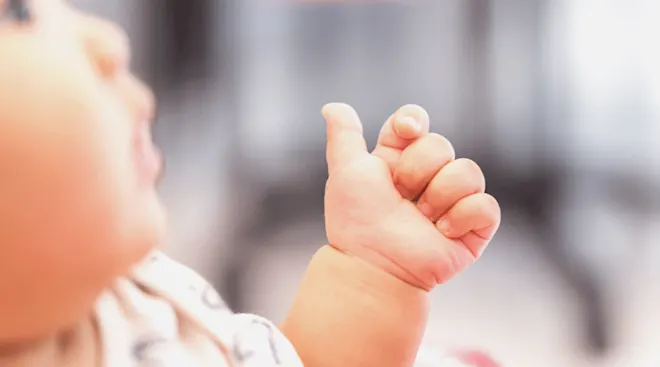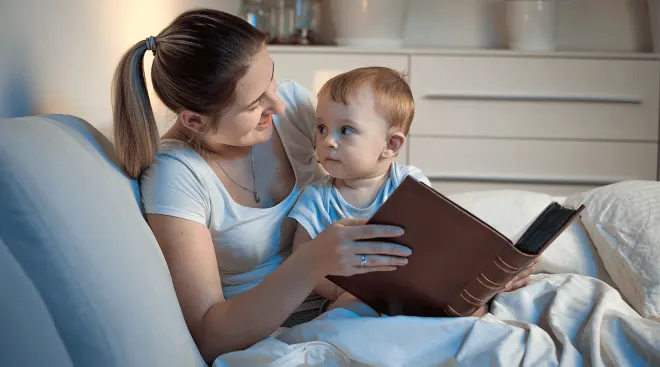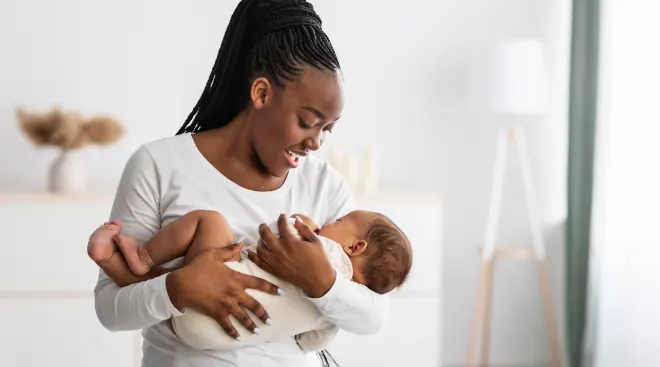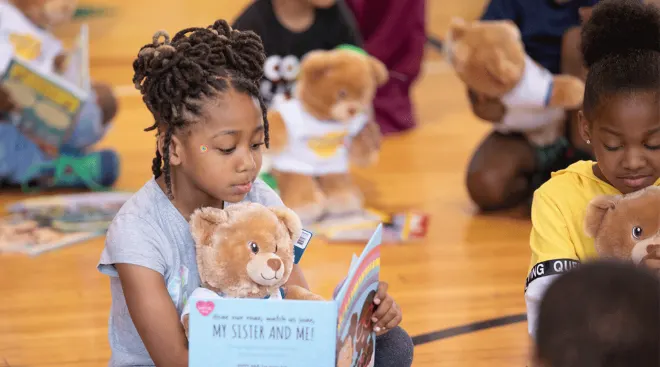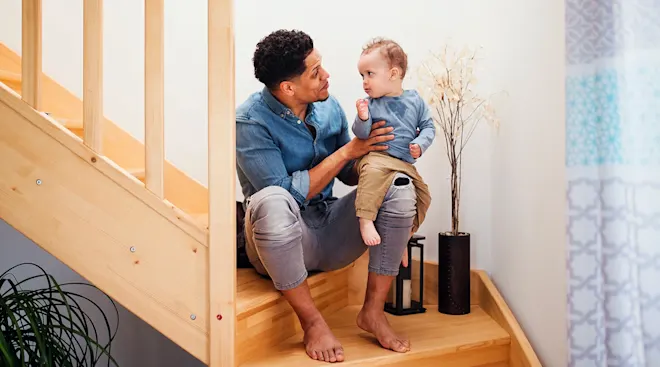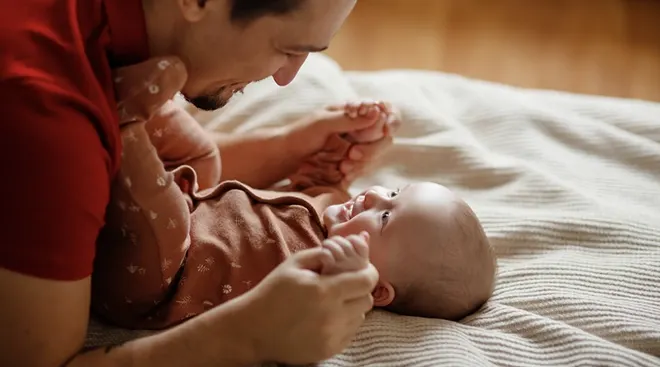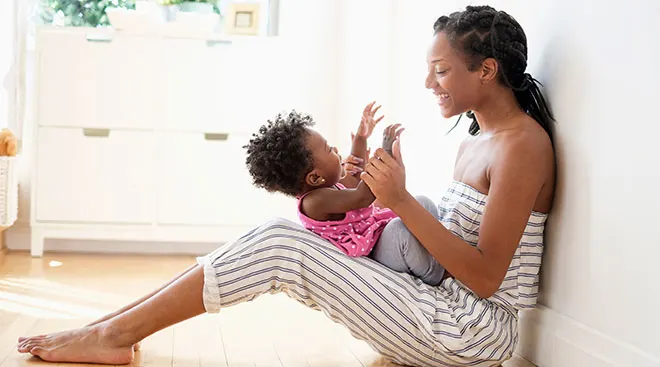When Do Babies Say Mama or Dada?
Hearing baby start to babble is pretty thrilling because it means they’re one step closer to talking! As you eagerly await those first words, you’re likely wondering what they’ll be—and there’s a good chance it’ll be “mama” or “dada.” After all, according to experts and research, baby’s first words tend to be based on the things they see and hear the most. While it’s unlikely baby will say either one soon after starting to babble, it naturally raises an important question: Just when do babies say “mama” and/or “dada” anyway? And which one will they say first and why? Keep reading to learn more, straight from the experts.
While the timeline can differ for every child—even those in the same family—most babies start stringing together syllables that sound like “mamamama” or “dadadadada” by 7 months, says Jennifer L. Maietta, MS, CCC-SLP, a pediatric speech-language pathologist at MassGeneral Hospital for Children in Boston. As baby approaches 9 months (and beyond), they’ll start trying to say “mama” or “dada”—but that doesn’t mean they actually know what it means yet. Baby may look at either parent to say “mama” or “dada”—or they may even say it to a stranger, like the mail carrier. “They’ll say it to anybody,” says Danelle Fisher, MD, FAAP, chair of pediatrics at Providence St. John’s Health Center in California. So when do babies say mama or dada and mean it? Around the one-year mark baby will likely start to use the words correctly within context, and, when it happens, “it’s magical,” Fisher says. “When they look at you and say ‘mama’ or ‘dada’ and mean it, it’s the best thing in the world.”
Many experts and researchers believe that babies say “dada” before “mama” because “da” sounds are easier for little ones to produce. However, Gina Posner, MD, a pediatrician at MemorialCare Orange Coast Medical Center in Fountain Valley, California, says—like so many milestones—this varies from baby to baby. “Some kids are really obsessed with the ‘da’ sound, and others like the ‘ma’ sound,” she explains. Whichever they latch onto in the beginning will help determine which word they say first. Usually, the order in which babies say “mama” or “dada” has nothing to do with them preferring one caregiver over another. That said, if baby does spend more time with one parent, they may have a leg up, Fisher says, as babies may say the name of their primary caregiver first.
While you can’t rush baby’s development, there are a few ways to help teach your child to say mama, dada or other parental names. Below, the experts share their tips:
-
Repeat the names constantly: Babies imitate their parents, Fisher says, so continually sounding out “mama,” “dada” and other parental names, while encouraging your child to repeat the words is key. Goff agrees, adding, “The more the baby hears you say these names the better.”
-
Refer to yourself in third person: To help baby understand what the words actually mean, make sure to teach them in context. Goff and Posner recommend talking in third person and saying things like, “Look at Mama! Mama has food for you,” or “Dada’s going to change your diaper.” This way baby can start associating their caregiver with their name, Posner says. “Babies don’t understand pronouns like ‘I, she, me or him,’” Goff adds. “If you name the person, they’ll understand the name association better and more quickly.”
-
Read together: When it comes to fostering baby’s language development in general, the best way is to play and read together (while limiting electronics and screen time), Maietta says. She recommends finding children’s books that rely heavily on the words “mama” and “dada” (or your preferred parental name) and read them often—it can go further than you think.
Saying “mama” or “dada,” is a major baby milestone, but, of course, it’s important to acknowledge—and normalize—all types of modern family structures. Though babies may start off by making the “mamama” or “dadada” sounds, know that there are lots of ways to help them start recognizing your preferred parental name in context—whatever you want it to be. According to Renée L. Goff, PsyD, PMH-C, a licensed clinical psychologist certified in perinatal mental health, some parents may prefer to use variations of “mama” and “dada,” or parental names from different languages or cultures. “There tends to be judgment or a sense of confusion from others if the children call you anything other than ‘Mom,’ ‘Mommy,’ ‘Dad’ or ‘Daddy,’ but it’s your family,” she says. “Do what feels best for you. It’s not your job to make others understand or feel comfortable with the name your children use for you and/or your partner.”
Every child is different, but if baby isn’t saying “mama” or “dada” by 12 to 15 months, flag it with your pediatrician. Most doctors expect children to have mastered those words by that point; for those who haven’t, a hearing test or speech therapy may be recommended. If your child says plenty of other words but “mama” or “dada” aren’t on the list, don’t panic. “While the words ‘mama’ and ‘dada’ are highly motivating for parents to hear, we’re more focused on whether the child is babbling using a variety of consonants, copying sounds and movements that a parent or caregiver does, using gestures like pointing and making eye contact and engaging in back-and-forth games like ‘peek-a-boo,’” Maietta says. If baby’s development is otherwise on track, don’t stress. “Mama” or “dada”—or whatever parental moniker you’re hoping to hear—will come in time—and it will be well worth the wait.
Please note: The Bump and the materials and information it contains are not intended to, and do not constitute, medical or other health advice or diagnosis and should not be used as such. You should always consult with a qualified physician or health professional about your specific circumstances.
Plus, more from The Bump:
Danelle Fisher, MD, FAAP, is the chair of pediatrics at Providence St. John’s Health Center in California. She earned her medical degree from Albert Einstein College of Medicine of Yeshiva University in New York City and completed her residency training at Children's Hospital Los Angeles in California.
Renée Goff, PsyD, PMH-C, is a licensed clinical psychologist and owner of Orchid Wellness & Mentoring in Cincinnati, Ohio. She received her doctor of psychology from Wright State University in Dayton, Ohio.
Jennifer L. Maietta, MS, CCC-SLP, is a pediatric speech-language pathologist to 6 years old at MassGeneral Hospital for Children in Boston. She earned her master’s degree in speech and language pathology from Boston University and is board certified by the American Speech-Language-Hearing Association.
Gina Posner, MD, is a pediatrician at MemorialCare Orange Coast Medical Center in Fountain Valley, California. She earned her medical degree from New York Medical College and completed her residency at White Memorial Medical Center in Los Angeles, California.
Royal Society Philosophical Transactions B, Real-world visual statistics and infants' first-learned object names, January 2017
Learn how we ensure the accuracy of our content through our editorial and medical review process.
Navigate forward to interact with the calendar and select a date. Press the question mark key to get the keyboard shortcuts for changing dates.








































